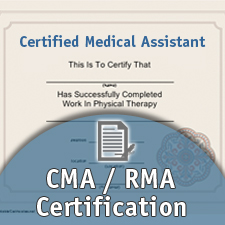Table of Contents
On the map below click your state to learn about medical assistant certification requirements, download applications, find Medical Assisting Board contact info, salaries and employment rates, state laws for working medical assistants, and more local info for becoming certified. Or scroll down to learn more about the various medical assistant certification programs available. ✔️ Page updated on: 10/31/2024
Alaska
Arizona
Arkansas
California
Colorado
Connecticut
Delaware
District of Columbia
Florida
Georgia
Hawaii
Idaho
Illinois
Indiana
Iowa
Kansas
Louisiana
Maine
Maryland
Massachusetts
Michigan
Minnesota
Mississippi
Missouri
Montana
Nebraska
Nevada
New Hampshire
New Jersey
New Mexico
New York
North Carolina
Ohio
Oklahoma
Oregon
Pennsylvania
Rhode Island
South Carolina
South Dakota
Tennessee
Texas
Utah
Vermont
Virginia
Washington
West Virginia
Wisconsin
Wyoming
Medical Assistant Certification Requirements
Each state has it’s own requirements and regulations for medical assistants. Although many states do not require medical assistant certifications, most employers do. So, to be competitive in the marketplace it is a good idea to get either your CMA or RMA title( certified medical assistant or registered medical assistant).
Working as a CMA or RMA in your state typically requires that you complete an accredited medical assistant program first and then passing a certification exam from one of 2 administering organizations. Typically states do not offer licenses for medical assistants, but they will certify or register medical assistants and employers prefer that you have this registration or certification. Each state has a board of medicine that oversees registered certified medical assistants and will offer specific requirements for working in that state.
We have compiled all of these requirements by state as well as any necessary application forms and medicine board contact information to make it simple for you to get started and complete the registration or certification process for medical assistants, regardless of the state you are working in.
RMA vs CMA Certification
Depending on your state, you may become either a Certified Medical Assistant or a Registered Medical Assistant. You can select your state on the map above to see if medical assistants require certification to work in your state.
The table below shows the requirements for both the RMA and CMA certifications.
Certification Requirement | CMA | RMA |
|---|---|---|
| Meet 1 of the eligibility requirements. (CMA requires graduating a CAAHEP or ABHES accredited program, RMA also offers eligibility from military education, work experience and instructing.) | View Eligibility Details | View Eligibility Details |
| Submit required supporting documentation for exam application process. | Documents | Documents |
| Apply for exam and pay application fee. | Application, $125 | Application, $120 |
| Schedule your exam date. | Schedule | Schedule |
| Complete your exam. (Upon completion, the CMA exam will show whether you pass/failed immediately and RMA exams taken online will provide your actual score immediately.) | Yes | Yes |
| Wait 8-10 weeks (CMA candidates will receive official test scores at this time and RMA candidates will receive their certification.) | Yes | Yes |
| Passing CMA applicants then wait another 10 weeks after receiving scores to receive their certification and card. | Yes | No |
| You have the ability to retest if you fail for both the CMA and RMA | Retest info | Retest info |
| Continuing Education, membership fees, and recertification are required for both the CMA and RMA | Recertify info | Recertify info |
The RMA registration and the CMA certification are both recognized by the AMA (American Medical Association). Even if your state doesn’t require an RMA or CMA for medical assistants, many employers will. Having either certification will make you more competitive in the job market and likely help you earn a higher salary.
Medical assistant certification is an important step for anyone looking to pursue a career in the medical field. With the right certification, you can open up a world of opportunities and become a valuable asset to any healthcare team.
There are five main types of medical assistant certifications available:
- Certified Medical Assistant (CMA)
- Certified Clinical Medical Assistant (CCMA)
- Registered Medical Assistant (RMA)
- National Certified Medical Assistant (NCMA)
- National Healthcareer Association (NHA) Medical Assistant
Each type of certification has its own unique requirements and benefits, so it’s important to understand which one is best suited for your career goals.
On this page, we’ll discuss each type of medical assistant certification in detail along with their certification examinations, so you can make an informed decision about which one is right for you. Learn all about exam fee payments, exam preparation materials, and answers to other basic examination questions.
 Certified Medical Assistant (CMA) by the AAMA
Certified Medical Assistant (CMA) by the AAMA
To become a Certified Medical Assistant (CMA), you must first complete an accredited medical assistant program. This program should include both classroom and clinical instruction, as well as hands-on experience in the field. Once you have completed the program, you will need to pass the CMA certification exam administered by the American Association of Medical Assistants (AAMA). The exam covers topics such as medical terminology, anatomy and physiology, pharmacology, medical law and ethics, patient care techniques and laboratory procedures. After passing the exam, you will receive your CMA certification and be eligible for employment in a variety of healthcare settings.
The cost to become a CMA through the AAMA is $125 for the exam fee and $50 for the application fee plus the cost of your education. (The exam fee is $250 for nonmembers)
Who is eligible to take the AAMA certification examination?
The American Association of Medical Assistants (AAMA) certification examination is open to any individual who has graduated from an accredited medical assisting program. This includes individuals who have completed a diploma, certificate, or associate degree program in medical assisting. In addition, those who have completed a military training program in medical assisting may also be eligible to take the AAMA certification exam.
Is the AAMA exam hard?
The AAMA exam is a comprehensive assessment of the knowledge and skills required to become a Certified Medical Assistant (CMA). It consists of 200 multiple-choice questions that cover topics such as medical terminology, anatomy and physiology, medical law and ethics, pharmacology, clinical procedures, and administrative duties. The exam is designed to be challenging and requires a significant amount of preparation in order to pass. There are helpful study guides and programs designed to help students pass the AAMA exam on their first attempt.
Which medical assistant certification is best?
When it comes to medical assistant certification, the American Association of Medical Assistants (AAMA) Certified Medical Assistant (CMA) credential is widely considered to be the best. The CMA certification is a nationally recognized credential that demonstrates a medical assistant’s knowledge and skills in all areas of medical assisting. It also shows employers that the individual has met the highest standards for professional competency.
What is the passing score for AAMA exam?
The passing score for the American Association of Medical Assistants (AAMA) Certified Medical Assistant (CMA) exam is a minimum of 405 out of 800 possible points. The exam consists of 200 multiple-choice questions that cover topics such as medical terminology, anatomy and physiology, patient care, medical office management, and laboratory procedures. Below is more info on how long is the AAMA test, what percentage is passing on CMA exam, and how many times can you fail the CMA exam.
To pass your CMA exam, you will need to be proficient in all of its content areas. To do so, you will take a total of 200 multiple-choice questions across all four topics. These questions are administered in four 40-minute segments, and you have access to an optional 15-minute tutorial that will show you how to navigate through them. You will have 20-minute breaks between each segment, but should you choose not to take breaks or use this tutorial, you will only have 160 minutes to answer all 200 questions on your test.
The exam sections are is broken down as follows:
- General questions make up 28% with 50 questions
- Administrative questions make up 25% with 45 questions
- Clinical – questions make up 45% with 85 questions
180 of the questions are scored and 20 are pretested questions. Your score on the exam will be based on your answers to only the questions that are scored. Pretested questions are not counted towards your final score, and you will be able to identify them as you take your exam.
You have 3 attempts to pass the AAMA CMA exam. It is recommended to be taken with 30 days of completing your medical assisting program and must be taken within 90 days. Each time you retake the exam you must apply and pay the exam fees.
How long is AAMA certification good for?
The American Association of Medical Assistants (AAMA) certification is valid for 60 months from the date of issue. After that, medical assistants must recertify to maintain their AAMA credentials. The recertification process requires medical assistants to complete continuing education credits and pay a fee. To be eligible for recertification, medical assistants must complete 60 CEU continuing education units or hours. Specifically, the following CEUs must be completed: 10 administrative, 10 clinical, 10 general, 30 from any combination of the above three categories.
Can you take your CMA test online?
No, you cannot take your Certified Medical Assistant (CMA) test online. The CMA exam is administered by the American Association of Medical Assistants (AAMA), and it must be taken in person at a designated testing center. To become certified, you must register with the AAMA and pay the required fees before scheduling an appointment to take the exam.
How do I study for the CMA exam?
Studying for the CMA exam can be a daunting task, but with the right approach and dedication, it is possible to pass the exam. The first step in studying for the CMA exam is to become familiar with the content of the exam. The American Association of Medical Assistants (AAMA) provides a comprehensive study guide that outlines all of the topics covered on the exam.
The AAMA comprehensive study guide for the CMA exam is an invaluable resource for those looking to become a Certified Medical Assistant. It provides detailed information on the topics covered in the exam, as well as practice questions and sample tests to help prepare for the exam. The guide also includes helpful tips and strategies to maximize success on the test. With its comprehensive coverage of all aspects of medical assisting, this is one of the best CMA exam study guides available.
What type of questions are on the medical assistant exam?
The American Association of Medical Assistants (AAMA) Certified Medical Assistant (CMA) exam is a comprehensive test that covers a wide range of topics related to medical assisting. The exam consists of 200 multiple-choice questions, divided into three sections: Clinical, General, and Administrative.
- The Clinical section focuses on the major clinical concepts, such as Clinical Workflow: Patient Intake and Discharge and Safety and Infection Control.
- The General section includes questions on general medical topics and things like legal and ethical issues and communication.
- The Administrative section includes questions on documentation, practice structure, and regulatory compliance such as billing and coding practices, insurance compliance, and scheduling patients.
AAMA CMA Exam Resources
Below are links to additional resources to help you prepare, apply and pass the AAMA CMA Exam.
Certified Clinical Medical Assistant (CCMA) by the NHA
To become a Certified Clinical Medical Assistant (CCMA), you must first complete an accredited medical assistant program. This program should include both classroom and clinical instruction, as well as hands-on experience in the field. After completing the program, you will need to pass the CCMA certification exam administered by the National Healthcareer Association (NHA). The exam covers topics such as medical terminology, anatomy and physiology, pharmacology, medical law and ethics, patient care techniques and laboratory procedures. Once you have passed the exam, you will receive your CCMA certification and be eligible for employment in a variety of healthcare settings.
The cost to become a CCMA through the NHA is $165 for the exam fee plus the cost of your education.
What score do you need to pass NHA exam / What percentage is passing for NHA
The CCMA exam is a pass/fail computer-administered test with scaled scores ranging from 200 to 500. The scores obtained in any variation of the CCMA exam are standardized and comparable. A score of 390 or greater is considered a passing score. To pass, you must get at least 78% of the questions correct.
How long is the NHA certification exam?
The National Healthcareer Association (NHA) Certified Clinical Medical Assistant (CCMA) certification exam is a three-hour, computer-based test consisting of 180 multiple-choice questions, 30 of which are pretested and do not count towards your final score. There are no breaks during the exam which covers topics such as medical terminology, anatomy and physiology, patient care and safety, medical law and ethics, laboratory procedures, pharmacology, and administrative tasks.
Can you take NHA exam at home?
No, you cannot take the NHA Certified Clinical Medical Assistant (CCMA) exam at home. The CCMA exam is administered in a secure testing center and must be taken in person. The exam is offered at more than 500 PSI / Pearson VUE testing centers throughout the United States and Canada. You must register for the exam online through the National Healthcareer Association (NHA) website and pay an exam fee.
What are some advantages of having NHA certification?
NHA certification is a widely recognized and respected credential in the healthcare industry. It shows that you are knowledgeable, experienced, and up-to-date on the latest in healthcare trends and practices. With NHA certification, you can open yourself up to a wide range of career opportunities, from medical billing to medical coding or even medical assistant roles. Not only will having this credential give you an edge in the job market, but it will also help you stay ahead of regulatory changes and remain competitive as a healthcare professional.
How can I study for NHA exam?
Studying for the NHA Certified Clinical Medical Assistant (CCMA) exam can be a daunting task. However, with the right preparation and resources, you can successfully pass the exam and become certified as a CCMA. The first step in studying for the NHA CCMA exam is to understand what topics are covered on the test.
The National Healthcareer Association (NHA) offers a variety of study materials to help prepare for the Certified Clinical Medical Assistant (CCMA) exam. These include practice tests, flashcards, and study guides. The NHA also provides an online course that covers all topics on the CCMA exam. This course is designed to provide a comprehensive review of the material and includes interactive quizzes and activities to help reinforce learning. Additionally, the NHA offers webinars and live seminars to further support test preparation. With these resources, individuals can gain a better understanding of what is expected on the CCMA exam and be well prepared for success.
How Is the NHA CCMA Exam Structured?
The CCMA exam has 180 questions, 30 of which are pretest questions for gathering data and won’t contribute to your overall score. To be successful as a CCMA, one has to be proficient in each of the tested areas so they can carry out their duties properly.
The CCMA exam covers the following topics
- Foundational Knowledge and Basic Science
- Anatomy and Physiology
- Clinical Patient Care
- Patient Care Coordination and Education
- Administrative Assisting
- Communication and Customer Service
- Medical Law and Ethics
After you submit your application to NHA, be on the lookout for a response in around one or two weeks. If they approve it, you can then arrange to take the exam at a PSI testing center near you.
More Resources for the NHA CCMA Exam
 Registered Medical Assistant (RMA) by the AMT
Registered Medical Assistant (RMA) by the AMT
To become a Registered Medical Assistant (RMA), you must first complete an accredited medical assistant program. This program should include both classroom and clinical instruction, as well as hands-on experience in the field. After completing the program, you will need to pass the RMA certification exam administered by the American Medical Technologists (AMT). The exam covers topics such as medical terminology, anatomy and physiology, pharmacology, medical law and ethics, patient care techniques and laboratory procedures. Once you have passed the exam, you will receive your RMA certification and be eligible for employment in a variety of healthcare settings.
The cost to become a RMA through the AMT is $135 for the exam fee plus the cost of your education.
What is on the AMT RMA exam?
The AMT RMA exam is a comprehensive exam designed to assess a medical assistant’s knowledge and skills. It covers topics such as medical terminology, anatomy and physiology, pharmacology, medical law and ethics, patient assessment, clinical procedures, and office management. The exam consists of 210 multiple choice questions, with each question covering a different topic. It is administered by the American Medical Technologists (AMT) and successful completion of the exam is required for certification as a Registered Medical Assistant (RMA).
The AMT exam is broken into 4 sections as follows:
| I. | Anatomy and Physiology | 46 | 21.9% |
| II. | Administrative Medical Assisting | 75 | 35.7% |
| III. | Clinical Medical Assisting | 31 | 14.7% |
| IV. | Clinical Patient Interaction | 58 | 27.6% |
How many times can you take the AMT exam
Each person can only take the AMT certification test 4 times during their lifetime. So, if you are wondering how many times can you fail the AMT exam, the answer is three times. After the 4th attempt, you won’t be able to take it again. If you don’t pass the exam, you can retake it after a period of 45 days. However, please note that an additional nonrefundable fee of $90 will be required for each attempt.
The American Medical Technologists (AMT) offers a variety of exam preparation resources to help students prepare for the RMA certification exam. These resources include practice tests, study guides, and online tutorials. The AMT also provides an online forum where students can ask questions and receive advice from experienced medical assistants who have already taken the exam. Additionally, the AMT offers live webinars and seminars to help students review key concepts and strategies for success on the RMA certification exam. With these resources, students can gain a better understanding of the material covered on the exam and increase their chances of passing it with flying colors on their first attempt.
How long is AMT certification good for?
Certification is a 3-year cycle with an annual fee that maintains your status year to year. The cost for certification renewal is $75 per year.
Certification as an AMT Registered Medical Assistant (RMA) is a three-year cycle that requires annual renewal. This renewal process helps to maintain the status of the RMA and ensures that all RMAs are up-to-date on their knowledge and skills.
What is the passing score for AMT RMA exam?
70% is considered a passing score for the AMT RMA exam. This means you must answer at least 147 multiple-choice questions correctly out of the 210 total questions. Currently, 77% of exam participants pass the exam.
Passing the AMT RMA exam is an important step in becoming a certified medical assistant. The exam covers a wide range of topics, including medical terminology, anatomy and physiology, pharmacology, medical law and ethics, patient assessment, clinical procedures, and office management. It consists of 210 multiple-choice questions and requires a score of 70% or higher to pass. To help prepare for the exam, the American Medical Technologists (AMT) offers practice tests, study guides, online tutorials, webinars, and seminars. With these resources and dedication to studying the material covered on the exam, students will have a higher chance of passing the exam on their initial attempt.
What are the Prerequisites for the RMA Exam?
If you’re looking to get your RMA certification, you must meet one of these criteria for eligibility in order to take the exam.
- Education: To be eligible for the job, you must have completed or be about to complete a degree from an accredited college or university. MA programs from accredited universities will be given preference.
- Military: Applicants for the military must have recently graduated from, or plan to graduate from a formal medical services training program of the U.S. Armed Forces.
- Work Experience: Applicants must have at least 5 years of work experience as a medical assistant in the last 7 years, with no more than 2 of those years being spent as an instructor for a post-secondary medical assistant program.
- Instructor: Applicants must currently be teaching at an accredited medical assistant program; have taken a healthcare-related course related to medical assisting; and have a minimum of five years of full-time teaching experience in the field.
How Do I Study for the RMA Exam?
The RMA certification exam consists of 210 multiple-choice questions and you have two hours to finish it. Although there’s a lot to learn, if you put in the effort and ask enough questions, you should be able to pass the exam on your first try. Here are some useful study tips for this test.
1. Know the Exam Topics
A detailed overview of the RMA exam can be accessed on the AMT website. This exhaustive list covers all of the subjects that could be present on the test. Review this exam outline and research any topics you are unfamiliar with.
2. Schedule Study Times
Dedicate specific times during the week to prepare for the RMA exam. Eliminate any potential distractions during these times. Begin studying right away to avoid the stress of cramming and give yourself ample time to go back over the topics you are struggling with.
3. Take RMA Practice Exam
AMT has a practice test available on their website. The price of the practice exam is $175. The questions on this test do not reflect the exact ones that will be on the actual exam; however, they cover the same topics, so taking it will help prepare you to succeed.
4. Take an RMA Exam Review Course
AMT provides online RMA prep courses covering topics such as General Knowledge, Medical Administration, and Clinical Practice. These courses are a great way to brush up on your skills and ensure you’re fully understanding all the material.
How much does the RMA exam cost?
The cost of the AMT RMA exam is $135. This fee covers the cost of the actual exam and all associated administrative costs as well as your first annual membership fee. This fee is non-refundable and must be paid prior to scheduling the exam.
Additional Resources for the AMT RMA Exam
- AMT Certified Medical Assistant Overview: https://americanmedtech.org/medical-assistant
- Certification Information: https://americanmedtech.org/Certification/Get-Certified
- Recertification Information: https://americanmedtech.org/Certification/Stay-Certified
 National Certified Medical Assistant (NCMA) by the NCCT
National Certified Medical Assistant (NCMA) by the NCCT
To become a National Certified Medical Assistant (NCMA), you must first complete an accredited medical assistant program. This program should include both classroom and clinical instruction, as well as hands-on experience in the field. After completing the program, you will need to pass the NCMA certification exam administered by the National Center for Competency Testing (NCCT). The exam covers topics such as medical terminology, anatomy and physiology, pharmacology, medical law and ethics, patient care techniques and laboratory procedures. Once you have passed the exam, you will receive your NCMA certification and be eligible for employment in a variety of healthcare settings.
The cost to become an NCMA through the NCCT is $119 for the exam fee plus the cost of your education.
Certified Medical Administrative Assistant (CMAA) by the NHA
To become a Certified Medical Administrative Assistant (CMAA) through the National Healthcareer Association (NHA), you must first complete an accredited medical assistant program. This program should include both classroom and clinical instruction, as well as hands-on experience in the field. After completing the program, you will need to pass the CMAA certification exam administered by the NHA. The exam covers topics such as medical terminology, anatomy and physiology, pharmacology, medical law and ethics and medical billing and coding. Once you have passed the exam, you will receive your CMAA certification and be eligible for employment in a variety of healthcare settings.
The cost to become a certified medical administrative assistant is $129 for the exam fee plus the cost of your education.
FAQ: Frequently Asked Questions
Below are some frequently asked questions about medical assistant certifications and how to become a certified medical assistant.
1. How to Become a Certified Medical Assistant

Pro: Education is short, only a 2 year associates degree or a 6 month diploma program (certificate)
Pro: Finding a job is much easier with certification
Pro: You will earn a higher salary and have specialization opportunities
Con: You must make an investment in your education, and the exam fee is $150
If you want a competitive advantage in the job market, more specialized job opportunities, higher pay, and higher job security then you should get certified by the American Association for Medical Assistants (AAMA) or American Medical Technologists (AMT). These programs are designed to help those who’d like to become medical assistants get their RMA or CMA certification and land better jobs that pay higher.
2. How Long Does it Take to Become a Medical Assistant?
- An Associate Degree Program takes 2 years
- Certificate programs take anywhere from 6 weeks to 1 year.
Becoming a medical assistant can vary in time, depending on your chosen program. Many programs wrap up in about a year, but others may require more time for extra courses like anatomy, medical terms, or drug studies. In some states, on-site training or an externship is necessary before certification, which can stretch the process longer. Nonetheless, a medical assisting career offers many positive benefits, making the time investment worthwhile.
Medical assisting is a rewarding career that is worth the length of time it takes to begin working in the medical field. It is worth noting that there are some certificate programs that can be completed in a matter of months. They won’t include hands-on training but can still help you take your certification exam. An accredited medical assistant school may take up to two years to complete all courses and clinical experiences through an externship, while some technical schools offer shorter medical assistant training programs. Certification requirements vary by state and professional certification organization.
3. What Education is Required to Be a Medical Assistant?
- Completing a diploma or associate degree program including an externship
- Passing a national certification exam
You need to complete a postsecondary education program in order to become a certified medical assistant. These programs are offered locally and online at community colleges, trade schools, and universities. They teach everything required to become a medical assistant including subjects like anatomy, medical terms, drug studies, clinical methods, and administrative duties. Some states also mandate externships or workplace training before certification. So, depending on your choice of program and your state’s rules, it can take up to two years to become a certified medical assistant.
4. How Hard is the Medical Assistant Exam or the CMA Exam?
- 200 multiple choice questions on the topics covered in your medical assisting program
- Challenging but graduates of medical assisting programs should be able to pass
The medical assistant test, also known as the CMA Exam, is a demanding exam. It requires a solid grasp of the curriculum taught in a medical assistant program. The test contains 200 multiple-choice questions on topics like anatomy, medical terminology, drug studies, clinical tasks, and office duties. These results may inform how employers judge potential hires’ skillset for certification as a medical assistant. Typical questions could be identifying common illnesses, carrying out simple lab tests, and accurately recording patient information. While the CMA Exam can be tough, students who have passed a medical assistant program should have no problem passing the exam.
5. How Can I Become a Medical Assistant Fast?
- Find an accelerated program that can be completed in as little as 6 weeks
- Accelerated certificate programs take anywhere from 6 weeks to 9 months
To become a medical assistant quickly, you should find a medical assistant program offering accelerated courses. These programs are delivered partially online with some face-to-face learning and can sometimes be finished in as little as six weeks to six months. Some states require an externship or on-site training before achieving certification, so factor this into your timeline as well. When picking a program, check for accreditation with the Commission on Accreditation of Allied Health Education Programs (CAAHEP) or the Accrediting Bureau of Health Education Schools (ABHES).
6. What Can a Medical Assistant Do?
- Medical Assistants perform both clinical tasks and administrative tasks
- Medical Assistants work in a variety of different types of health care facilities
Medical assistants are involved in the healthcare clinics they serve in a variety of capacities both administratively and clinically. They work in a wide variety of healthcare settings and they do a lot – taking patient histories, noting vital signs, prepping patients for exams, administering drugs, collecting, and processing lab samples, even carrying out simple lab tests. They manage appointments, help educate patients, process insurance forms and managing patient data for billing. With the right training and qualification, they can even support doctors with minor surgeries.
Maintaining patient medical records, be it on paper or electronic health records systems, also falls under their responsibility. By juggling all these roles, medical assistants are fundamental to delivering high-quality patient care.
7. Is Medical Assistant Harder than Nursing?
- Medical Assisting and Nursing have similar requirements but Nursing has more
- Nurses require more schooling and a more difficult licensing exam
Becoming a medical assistant or nurse have similar requirements but nurses have slightly more requirements. Nursing programs require higher education and can take a minimum of two years to complete whereas medical assistant programs can be completed more quickly. Both roles require knowledge of anatomy, medical terms, drug studies, clinical tasks, and administrative duties. However, nurses need detailed understanding because of their direct patient care role with less focus on office tasks. They must also pass the NCLEX-RN exam for licensing, which is not needed for medical assistants. It is more often slightly more difficult to become a nurse than a medical assistant.
8. How to Become a Medical Assistant Without Certification

Pro: Bypassing education and starting work right away
Pro: Receive on the job training and get paid to learn
Con: Finding a job is much more difficult without certification
Con: You will be paid less in most cases
If you’d like to become a medical assistant, then there are two routes you can take to get started with your career: on the job training or a medical assistant certification.
It is good for some to know that you don’t necessarily need to have a certification to work as a medical assistant. For some people, without time or financial resources for a college education, getting to work as a medical assistant without certification is the only option.
Before working as a medical assistant, you will need to obtain a diploma from high school. If you haven’t finished high school, you’ll need to at least obtain your GED. Then you will need to find employment where you can receive on the job training. However, it may be a bit more of a challenge for you to find the ideal job if you aren’t certified to work as a medical assistant.
Most medical assistants who don’t have their certification are paid a lower salary than those who are certified. If you’re trying to land a job without your certification, you’ll need to have a good personality as well as good listening skills so that you perform well in your job interview since you won’t have any prior experience on your resume.





